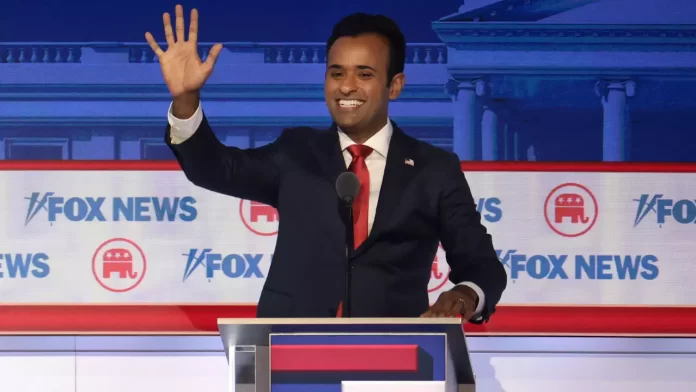The debate stage saw a face-off between former South Carolina Governor Nikki Haley and tech entrepreneur Vivek Ramaswamy. The spotlight was cast on their differing foreign policy stances, particularly concerning Ukraine and Israel
In an unprecedented event, two Indian American contenders seeking the highest office in the United States have qualified for a presidential debate, marking a significant moment in American political history. The debate, featuring eight Republican presidential candidates, took place on August 23 in Milwaukee, as reported by ksby.com.
The debate stage saw a face-off between former South Carolina Governor Nikki Haley and tech entrepreneur Vivek Ramaswamy. The spotlight was cast on their differing foreign policy stances, particularly concerning Ukraine and Israel.
During the debate, a pivotal moment arose when Ramaswamy indicated his willingness to support cutting aid to Ukraine. Haley swiftly seized on this opportunity to highlight what she saw as Ramaswamy’s lack of foreign policy experience. She asserted that Ukraine plays a crucial role as the first line of defense for the United States and criticized Ramaswamy for seemingly aligning with Russia on the issue. Furthermore, she accused him of advocating for China’s control over Taiwan and suggested he wanted to halt funding for Israel.
Ramaswamy countered by sarcastically wishing Haley success in her future endeavors with companies like Lockheed and Raytheon. However, Haley promptly refuted the claim, emphasizing that she was not associated with those companies. She reiterated her points, stressing Ramaswamy’s alleged lack of foreign policy experience and asserting that his views on these critical matters were indicative of his inexperience.
The debate garnered intense interest from the Indian American community, as both candidates shared their perspectives and engaged in a spirited exchange. According to Pew Research, a significant portion of Indian Americans align with the Democratic Party, though there are variations based on factors such as birthplace and immigration status. The debate offered insights into the potential conservative leanings of Indian Americans and highlighted the stark differences between the two major political parties.
Dev Karlekar, a Republican from New Jersey, expressed pride in witnessing two Indian American GOP candidates on the stage. He endorsed both Haley and Ramaswamy, noting Haley’s extensive public service background and Ramaswamy’s successful entrepreneurial achievements. Karlekar, a member of the GOP South Asian Caucus, plans to support the eventual Republican candidate in the general election.
-
During the debate, a pivotal moment arose when Ramaswamy indicated his willingness to support cutting aid to Ukraine
-
Haley swiftly seized on this opportunity to highlight what she saw as Ramaswamy’s lack of foreign policy experience
-
She asserted that Ukraine plays a crucial role as the first line of defense for the United States and criticized Ramaswamy for seemingly aligning with Russia on the issue
Democratic circles within the Indian American community expressed reservations about the extreme positions taken by both Haley and Ramaswamy. Navjot Kaur from New York City, a Democrat engaged in political activities, lamented that these candidates, who benefitted from the Immigration and Nationality Act of 1965, seemed opposed to extending similar opportunities to others. Kaur underlined the significance of the contrast between the parties from an Indian American perspective.
Kamala Harris, a biracial Indian American, previously participated in presidential debates in 2019 before being chosen as Vice President by President Joe Biden. The debate stage also featured other prominent figures like Florida Governor Ron DeSantis, South Carolina Governor Tim Scott, former New Jersey Governor Chris Christie, former U.S. Vice President Mike Pence, former Arkansas Governor Asa Hutchinson, and North Dakota Governor Doug Burgum.
Vivek Ramaswamy, a 37-year-old Hindu from Ohio, has positioned himself as a pro-Trump candidate, while 51-year-old Nikki Haley, who converted from Sikhism to Christianity, has had varying stances on former President Trump’s policies. Haley served as the 29th U.S. Ambassador to the United Nations during the Trump administration
To qualify for the debate, candidates needed a minimum of 40,000 donors and a polling threshold of 1% in both national and state-level polls.
Vivek Ramaswamy, a 37-year-old Hindu from Ohio, has positioned himself as a pro-Trump candidate, while 51-year-old Nikki Haley, who converted from Sikhism to Christianity, has had varying stances on former President Trump’s policies. Haley served as the 29th U.S. Ambassador to the United Nations during the Trump administration.
Their regional backgrounds reflect the diversity of India: Ramaswamy’s family hails from Kerala in southern India, while Haley’s roots trace back to Punjab in the north. This difference has been compared to the diversity between regions within the U.S., such as New York and Texas.
Karlekar emphasized the unity of the Indian community in the U.S., drawing parallels with India’s diverse heritage where various religions and cultures have coexisted for millennia.
******************************************************
Readers
These are extraordinary times. All of us have to rely on high-impact, trustworthy journalism. And this is especially true of the Indian Diaspora. Members of the Indian community overseas cannot be fed with inaccurate news.
Pravasi Samwad is a venture that has no shareholders. It is the result of an impassioned initiative of a handful of Indian journalists spread around the world. We have taken the small step forward with the pledge to provide news with accuracy, free from political and commercial influence. Our aim is to keep you, our readers, informed about developments at ‘home’ and across the world that affect you.
Please help us to keep our journalism independent and free.
In these difficult times, to run a news website requires finances. While every contribution, big or small, will makes a difference, we request our readers to put us in touch with advertisers worldwide. It will be a great help.
For more information: pravasisamwad00@gmail.com



